Since private and publick Vices, are in Reality, though not always apparently, so nearly connected, of how much Importance, how necessary is it, that the utmost Pains be taken by the Publick, to have the Principles of Virtue early inculcated on the Minds even of Children, and the moral Sense kept alive, and that the wise Institutions of our Ancestors for these great Purposes be encouragd by the Government. For no People will tamely surrender their Liberties, nor can any be easily subdued, when Knowledge is diffusd and Virtue is preservd. On the Contrary, when People are universally ignorant, and debauchd in their Manners, they will sink under their own Weight without the Aid of foreign Invaders.
—Samuel Adams, in a letter to James Warren, November 4, 1775—
Key point: Liberty flourishes in the soil of an awareness of one’s accountability to God and an acceptance of one’s duty to obey His laws. In 1926, when America was 150 years old, it still had a president who understood this truth and who articulated it powerfully at the nation’s birthday celebration.
Why Philadelphia? Philadelphia is the city, and Philadelphia’s Independence Hall the place, where the Second Continental Congress debated, and on July 2, 1776, approved, Virginia delegate Richard Henry Lee’s resolution to sever all ties to Great Britain. Philadelphia is where, two days later, on Thursday, July 4, the Congress adopted the Declaration of Independence, the formal document establishing the Colonies as a new nation. It eloquently stated
That these united Colonies are, and of Right ought to be Free and Independent States, that they are Absolved from all Allegiance to the British Crown, and that all political connection between them and the State of Great Britain, is and ought to be totally dissolved; and that as Free and Independent States, they have full Power to levy War, conclude Peace, contract Alliances, establish Commerce, and to do all other Acts and Things which Independent States may of right do.
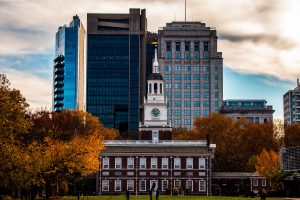
Take five minutes to watch and listen to Dave Stotts of Drive Thru History talk about the circumstances and setting of this pivotal event in American and world history.
Fast Forward 150 years, to 1926
On Monday, July 5, 1926, US President Calvin Coolidge delivered an important speech at the Sesquicentennial Exposition. It’s a fascinating fact that Coolidge was born on July 4, 1872, so he had just celebrated his 54th birthday the day before. Coolidge is the only president born on Independence Day. The title of his speech was “The Inspiration of the Declaration of Independence.” An abridged version of the speech is available here. Coolidge declared in part,
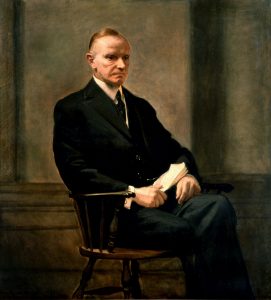
About the Declaration there is a finality that is exceedingly restful. It is often asserted that the world has made a great deal of progress since 1776, that we have had new thoughts and new experiences which have given us a great advance over the people of that day, and that we may therefore very well discard their conclusions for something more modern. But that reasoning can not be applied to this great charter. If all men are created equal, that is final. If they are endowed with inalienable rights, that is final. If governments derive their just powers from the consent of the governed, that is final. No advance, no progress can be made beyond these propositions. If anyone wishes to deny their truth or their soundness, the only direction in which he can proceed historically is not forward, but backward toward the time when there was no equality, no rights of the individual, no rule of the people. Those who wish to proceed in that direction can not lay claim to progress. They are reactionary. Their ideas are not more modern, but more ancient, than those of the Revolutionary fathers.…
The rights of the individual are held sacred and protected by constitutional guaranties, which even the Government itself is bound not to violate.
The Bedrock Foundation of Authentic Liberty
As I have contemplated the fast-approaching 246th birthday of the United States of America (in 2022) and the corresponding anniversary of the adoption of the Declaration of Independence on July 4, President Coolidge’s words have resonated deeply within me. In 2019 I wrote a series of articles I titled “Principles of Liberty.” In it I explored with my readers ten principles embedded in the Declaration that “align with biblical teachings.” Nearly a year later, on June 12, 2020, I released a 5-session Bible study that takes a deep dive into Scripture to explore these same principles and to demonstrate how the Founders applied them in their efforts to establish a free, yet orderly and prosperous, new nation.

The Founding Fathers of America were not perfect men, but generally speaking, they were Christians who revered “the Laws of Nature and of Nature’s God.” Holding a biblical worldview, they sought to apply biblical truths in the arenas of government and public life as well as in personal and private realms. This, I believe, is a primary reason why America quickly became the freest, and yet the most prosperous and productive, country among all the nations of the world.
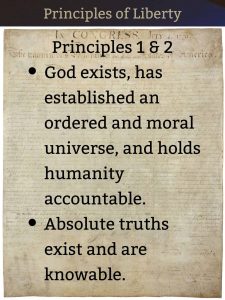 In this post, against the backdrop of President Coolidge’s affirmations about the Declaration of Independence, I’d like to reflect on the first two principles showcased on the ten-item list. They are
In this post, against the backdrop of President Coolidge’s affirmations about the Declaration of Independence, I’d like to reflect on the first two principles showcased on the ten-item list. They are
-
- God exists, has established and ordered and moral universe, and holds humanity accountable.
- Absolute truths exist and are knowable.
Americans don’t realize it today, but these two principles constitute the most basic portion of the bedrock foundation of authentic liberty.
Self-Evident Order and Purpose, and Divinely Revealed Answers to Questions that Arise from Our Observations
While the world and even the universe in which we live possess a self-evident order about them that never could have resulted from random chance, and while we know intuitively that the source of that order is God; the Scriptures tell us things about the Creator God we otherwise would not know. They explain who He is, and that He is the source of the order we observe around us. The Scriptures also shed light on the purpose for which human beings inhabit the world. Again, God is the Creator, and He brought into being an orderly universe and an orderly world. Moreover, He created human beings in His own image and placed them on the earth to engage in creative work themselves and to be purposefully productive.
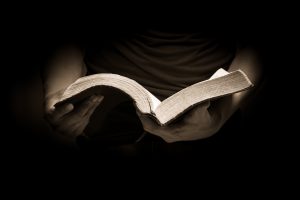
Yes, the ordered nature of life and the world before us are self-evident, yet we sense that something is not as it should be. Again the Scriptures answer our questions, not exhaustively (as Christian statesman Francis Schaeffer [1912-1984] frequently would say), but adequately and accurately, or truly. The Bible not only reveals to us that man’s (humanity’s) sin severed his relationship with God; it also informs us about God’s plan to rectify the problem and to restore humanity to Himself.
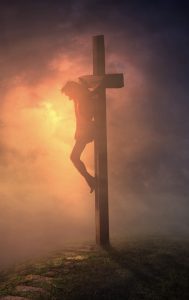
The divine plan is gracious beyond description in that it involves our freely placing our faith in Him and relying on what Jesus did in living a holy life and dying on a Roman cross to pay the penalty for human sin. Even so, His plan also calls on us to revere Him and to live in obedience to His moral and ethical laws — not to earn forgiveness of sins, but because we have been forgiven. Note carefully that Ephesians 2:8-10 emphasizes that salvation comes to us by grace through faith and not as a result of our own works, but then emphasizes our duty to perform good works because “God prepared beforehand that we should walk in them.” Titus 2:11-12 conveys this package of ideas as well.
With these spiritual truths in mind, let’s consider seven Bible passages. A printable sheet containing the text of these passages is available here. We turn now to
The Bible declares,
One: In the beginning God created the heavens and the earth (Gen. 1:1).
Two: [W]hat may be known of God is manifest in them [people everywhere], for God has shown it to them. 20 For since the creation of the world His invisible attributes are clearly seen, being understood by the things that are made, even His eternal power and Godhead, so that they are without excuse… (Rom. 1:19-20).
Three: [W]ithout faith it is impossible to please Him, for he who comes to God must believe that He is, and that He is a rewarder of those who diligently seek Him (Heb. 11:6).
Four: 1:15 He [Jesus Christ] is the image of the invisible God, the firstborn over all creation. 16 For by Him all things were created that are in heaven and that are on earth, visible and invisible, whether thrones or dominions or principalities or powers. All things were created through Him and for Him. 17 And He is before all things, and in Him all things consist (Col. 1:15-17).
Five: 4:12 For the word of God is living and powerful, and sharper than any two-edged sword, piercing even to the division of soul and spirit, and of joints and marrow, and is a discerner of the thoughts and intents of the heart. 13 And there is no creature hidden from His sight, but all things are naked and open to the eyes of Him to whom we must give account. 14 Seeing then that we have a great High Priest who has passed through the heavens, Jesus the Son of God, let us hold fast our confession (Heb. 4:12-14).
Six: 19:7 The law of the Lord is perfect, converting the soul;
The testimony of the Lord is sure, making wise the simple;
8 The statutes of the Lord are right, rejoicing the heart;
The commandment of the Lord is pure, enlightening the eyes;
9 The fear of the Lord is clean, enduring forever;
The judgments of the Lord are true and righteous altogether.
10 More to be desired are they than gold,
Yea, than much fine gold;
Sweeter also than honey and the honeycomb.
11 Moreover by them Your servant is warned,
And in keeping them there is great reward (Ps. 19:7-11).
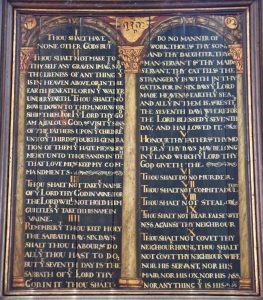
Seven: [Jesus said,] “He who has My commandments and keeps them, it is he who loves Me. And he who loves Me will be loved by My Father, and I will love him and manifest Myself to him” (John 14:21).
Now recall the first two of the ten “Principles of Liberty” we have observed to be embedded in the Declaration of Independence.
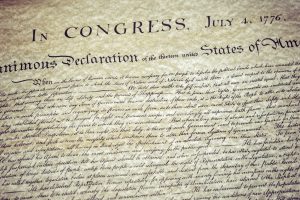
-
-
- God exists, has established and ordered and moral universe, and holds humanity accountable. Scripture passages 1, 2, 3, 4, and 5 —Genesis 1:1; Romans 1:19-20; Hebrews 11:6; Colossians 1:15-17; Hebrews 4:12-14 are foundational for this first principle.
- Absolute truths exist and are knowable. Passages 2, 6, and 7 — Romans 1:19-20; Psalm 19:7-11, John 14:21 — are foundational for the second.
-
Of course, additional Bible passages could be added. For example, as you continue to read, keep in mind the Ten Commandments, which are found in Exodus 20 and Deuteronomy 5. For the most part, though, the portions of Scripture we’ve already cited should be adequate for our discussion.
President Coolidge “Gets It”
Interestingly, Genesis 1:1 doesn’t argue for God’s existence; it rather assumes it, even as it points to evidence for God’s existence immediately after it mentions God ( “the heavens and the earth” ). You see, evidence for God’s existence abounds. Someone may say, How can a good God exist when there is so much evil in the world? Yet if He did not exist and all that exists came into being as a result of random, material forces, then good and evil cannot exist at all. The immaterial cannot arise from the material, nor can order arise from chaos. Thus, the very concept of good and evil and our own innate understanding that they are real is evidence that God is real.
God is the source of all that is. He is a God of order (see Col. 1:15-17), and God over an “order” that is self-evident (just as Romans 1:19-20 indicates). Accordingly, “the Laws of Nature and of Nature’s God” also are “self-evident.” This means, among other things, that God holds people accountable for how they live their lives (see Heb. 4:12-14). This truth is inescapable.
To the Lord God, all things are not the same (see Ex. 20:1-17; Deut. 5:1-22). Right and wrong exist. Morality and ethics, which are absolute, are real and knowable (see Rom. 1:19-20; Ps. 19:7-11, John 14:21) — just as Principle 2 affirms.
This means that certain truths are fixed. They are immovable and applicable to all, regardless of time, place, and circumstances. They apply to governments, too. They cannot be improved upon. They are inherently right, for they originated in the Creator God Himself (who, by the way, is Himself holy).
Many Americans today cringe at the idea that right and wrong are absolute and not subject to majority vote or personal opinion. Further, many believe that absolute standards of right and wrong place them in bondage. The opposite actually is true. Because eternal principles are rooted in God, they are rooted in truth, and they are liberating. Because they are immutable, they provide security and safety for individuals and society when they are honored. Affirmation of God’s law as absolute is part of the bedrock foundation of authentic liberty.
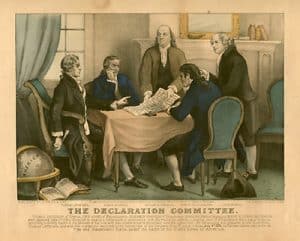
Fortunately for America, the nation’s Founding Fathers recognized, revered, and publicly acknowledged “the Laws of Nature and of Nature’s God.” They understood that virtue and liberty aren’t just friends, but wed to each other. They drew upon biblical principles when they cited the “unalienable Rights” that God bestows on human beings — members of His highest creation — because He made them in His image. The Founders tapped biblical tenets when they said that “to secure these rights, Governments are instituted among Men, deriving their just powers from the consent of the governed.” The realities and ideals the Founders upheld weren’t government’s, but God’s. Government didn’t create them; nor can it alter or change them. Unfortunately, it can violate them, but when it does, it abuses its God-given authority.
President Coolidge acknowledges these realities implicitly in the portion of his speech we’ve already cited. Read it again in light of the Bible passages we’ve discussed and in light of Principles 1 and 2 on our list. When a printer is available, print out this portion of President Coolidge’s speech and highlight or underline the statements that stand out to you. Said Coolidge,
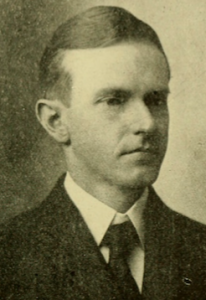
About the Declaration there is a finality that is exceedingly restful. It is often asserted that the world has made a great deal of progress since 1776, that we have had new thoughts and new experiences which have given us a great advance over the people of that day, and that we may therefore very well discard their conclusions for something more modern. But that reasoning can not be applied to this great charter. If all men are created equal, that is final. If they are endowed with inalienable rights, that is final. If governments derive their just powers from the consent of the governed, that is final. No advance, no progress can be made beyond these propositions. If anyone wishes to deny their truth or their soundness, the only direction in which he can proceed historically is not forward, but backward toward the time when there was no equality, no rights of the individual, no rule of the people. Those who wish to proceed in that direction can not lay claim to progress. They are reactionary. Their ideas are not more modern, but more ancient, than those of the Revolutionary fathers..…
The rights of the individual are held sacred and protected by constitutional guaranties, which even the Government itself is bound not to violate.
The Importance of Character, of Which God Is the Source
There’s More! In concluding, I’d like to invite you to read an earlier section of President Coolidge’s speech. As you read, keep in mind
-
- the Bible passages we have read,
- the principles we have cited, and
- the remarks Coolidge made with which you already are familiar.
Here’s what our 30th president said in his presentation just before the section we’ve already considered. (As before, you can print out this second portion of the speech when you have access to a printer and underline or highlight the insights that impress you.)
[I]t is but natural that the first paragraph of the Declaration of Independence should open with a reference to Nature’s God and should close in the final paragraphs with an appeal to the Supreme Judge of the world and an assertion of a firm reliance on Divine Providence. Coming from these sources, having as it did this background, it is no wonder that Samuel Adams could say, “The people seem to recognize this resolution as though it were a decree promulgated from heaven.”
No one can examine this record and escape the conclusion that in the great outline of its principles the Declaration was the result of the religious teachings of the preceding period. The profound philosophy which Jonathan Edwards applied to theology, the popular preaching of George Whitefield, had aroused the thought and stirred the people of the Colonies in preparation for this great event.…[W]hen we come to a contemplation of the immediate conception of the principles of human relationship which went into the Declaration of Independence we are not required to extend our search beyond our own shores. They are found in the texts, the sermons, and the writings of the early colonial clergy who were earnestly undertaking to instruct their congregations in the great mystery of how to live. They preached equality because they believed in the fatherhood of God and the brotherhood of man. They justified freedom by the text that we are all created in the divine image, all partakers of the divine spirit.…
[Thus, I]n its main features the Declaration of Independence is a great spiritual document. It is a declaration not of material but of spiritual conceptions. Equality, liberty, popular sovereignty, the rights of man – these are not elements which we can see and touch. They are ideals. They have their source and their roots in the religious convictions. They belong to the unseen world. Unless the faith of the American people in these religious convictions is to endure, the principles of our Declaration will perish. We can not continue to enjoy the result if we neglect and abandon the cause.
Unless the faith of the American people in these religious convictions is to endure, the principles of our Declaration will perish. We can not continue to enjoy the result if we neglect and abandon the cause.
—Calvin Coolidge—
We are too prone to overlook another conclusion. Governments do not make ideals, but ideals make governments. This is both historically and logically true. Of course the government can help to sustain ideals and can create institutions through which they can be the better observed, but their source by their very nature is in the people. The people have to bear their own responsibilities. There is no method by which that burden can be shifted to the government. It is not the enactment, but the observance of laws, that creates the character of a nation.
It is not the enactment, but the observance of laws, that creates the character of a nation.
—Calvin Coolidge—
There you have it. In a very real sense, America’s destiny is in the hands of “We the People.” And the church needs to demonstrate to the rest of the nation the true keys to liberty. What are they?
-
- Acknowledge and revere the God of the Bible. He exists, has established and ordered and moral universe, and holds humanity accountable.
- Affirm God’s laws as absolute and beneficial to all those who respect, revere, and obey them. His laws exist and are knowable. Respond with obedience.
Once you’ve started, keep going. Dive into the Scriptures and discover the biblical truths on which the Founding Fathers established this nation. Incorporate the biblical wisdom they upheld into both your public and private life.
Beyond this, share these insights and understandings with others.
Liberty is worth it!
Copyright © 2022 by B. Nathaniel Sullivan. All rights reserved.
Photo by Colin Lloyd on Unsplash
Unless otherwise indicated, Scripture has been taken from the New King James Version®. Copyright © 1982 by Thomas Nelson, Inc. Used by permission. All rights reserved.

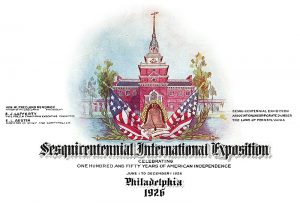
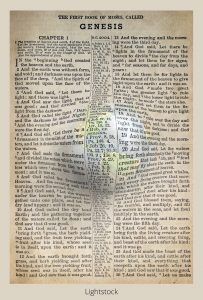
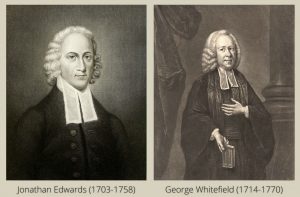
Be First to Comment